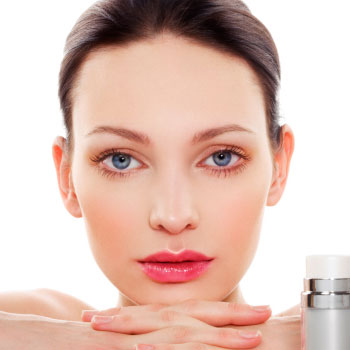Do You Really Need a Moisturizer?

Don’t be a slave to the lotion bottle – save your dry skin naturally!
Moisturizers have become the most popular answer to dry, scaly skin since they hit the pharmacy shelves. Check the beauty aisle at your local store and you’ll find dozens of options with all sorts of additives for all types of skin conditions. Many claim to be natural and include ingredients like Aloe vera, but that doesn’t mean they’re always the best option for your skin.
Can moisturizing be excessive?
Too much of anything – even a good thing – can have adverse effects, and that applies to moisturizers, too. Just like the rest of your body, your skin needs to rest and repair itself, which is typically done at night.
Dr. Alex Khadavi, a dermatology professor at the University of Southern California, told Prevention magazine, “Skin cell regeneration is slightly faster at night than during the day.” The article also quoted another expert, Dr. Sheldon Pinnell, as agreeing that “sleep hours are a potent time for your body to repair itself, skin included.”
When you first start a new moisturizer you need to watch your skin carefully to make sure it’s not causing other problems. For those with sensitive skin, stick to the simplest, most natural ingredients with no perfumes or harsh chemicals. If you have a diagnosed skin condition, your dermatologist will help you decide on the safest moisturizer for your body.
Dependency on Moisturizers Can Make Skin Worse
Unfortunately, once you stop using moisturizer things seem to get worse before they get better. A 2008 study conducted by Izabela Buraczewska of Uppsala University in Sweden, as relayed by ScienceDaily.com, showed that constant use of certain moisturizers can make the skin drier.
The study found that oil treatments, such as those using mineral oil and vegetable oils, resulted in less robust skin that was not as capable of withstanding external stresses. Skin treated with more complex creams did not result in skin dryness and the skin was more resistant to external stresses. Her research also showed that when the skin’s protective barrier is weakened, the genes that produce the skin fats may be affected.
If you’re looking to wean yourself off the moisturizer addiction, don’t go cold turkey. As you decrease your use, increase your awareness of some alternative ways to keep your skin naturally hydrated and moist. For example, if you exfoliate often, consider cutting back. If you live in a dry area, investing in a humidifier may help. The way you shower could also have an impact on skin dryness.
Save Your Skin in the Shower
Take a look at your shower habits, especially the three T’s: temperature, towels, and topicals. A steamy shower may seem like a great way to hydrate your skin, but Dr. Linda Stein Gold, clinical research director for Detroit’s Henry Ford Hospital dermatology department, told WebMD, “It can dry out the natural oils in our skin more quickly.”
Once you’ve dialed down the temperature, take a look at the products you use to clean your skin. If you’re sudsing up with a regular bar of soap, you might want to consider other options – harsh soaps can rob your skin of its natural moisture barrier. Look for soaps with milder ingredients that are fragrance-free and contain natural moisturizers like aloe or shea butter.
Watch how you’re applying your cleansing products, too, because harsh cloths and towels can irritate skin. Dr. Nanette Silverberg, dermatology professor at Columbia University told WebMD, “Friction strips the skin and enhances the dryness.” Instead, when applying products or scrubbing in the shower, Silverberg recommends a softer washcloth or even using your hands to apply soap or body wash. When toweling off, pat dry instead of rubbing too hard, as the latter may create lots of friction.
Skipping the Moisturizer Creams All Together
You don’t have to fear over-moisturization if you don’t need to do it in the first place! There are many reasons why you may develop dry skin – from your diet to your genetics. The good news is that there are many natural ways to moisturize without grabbing another bottle from the pharmacy shelves.
Your food can be a boon to your quest for moist, healthy skin the natural way. According to the FitSugar health blog, the moisture of your skin is influenced by how well it can retain water, and omega-3 fatty acids help your skin do just that. Omega-3’s are found in fatty fish like salmon and oil-rich foods like walnuts and flaxseed.
Dry skin is damaged skin, which is where some repair may be necessary. Before you break out the lotion bottle, consider adding more zinc-rich foods like oysters, beans, nuts, low fat yogurt, poultry, and whole grains. The zinc helps repair dry, cracked skin which is often why we turn to moisturizers in the first place. Another skin-repairing nutrient is vitamin A, which is found in your leafy greens like spinach and kale, but also in fruits and veggies like carrots, sweet potatoes, apricots and cantaloupe.
While we’re on the topic of vitamins, look for vitamin E to help your skin retain its natural moisture and boost your defense against the harmful UV rays that can lead to skin cancer. Good sources of vitamin E include green leafy vegetables like boiled spinach, as well as certain nuts and vegetable oils. So a meal of grilled salmon with an avocado and spinach salad with a low fat yogurt for desert could be great for your skin and your diet!.
If you must continue using a moisturizer make sure it’s not doing more harm than good. Moisturizers based from natural ingredients are typically the best choices, but for chronic or painful dry skin you should seek a dermatologist’s help in finding the right brand for your skin.

